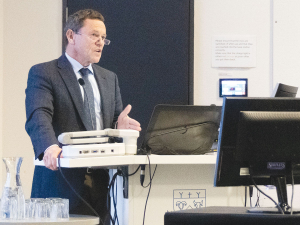Simon Upton urges cross-party consensus on New Zealand environmental goals
Parliamentary Commissioner for the Environment Simon Upton is calling for cross-party consensus on the country's overarching environmental goals.
 The Parliamentary Commissioner for the Environment, Simon Upton, speaking at the recent FAR conference at Lincoln. Photo: Rural News Group.
The Parliamentary Commissioner for the Environment, Simon Upton, speaking at the recent FAR conference at Lincoln. Photo: Rural News Group.
The Parliamentary Commissioner for the Environment, Simon Upton, has repeated his call for a full independent review of Overseer before any widespread adoption of it as a regulatory tool.
Upton reported last December on Overseer’s suitability for use in a regulatory context.
In the opening keynote address to the recent Foundation for Arable Research (FAR) conference at Lincoln, Upton said his report made 10 recommendations.
The most important was that the relevant ministers must decide whether they want Overseer used in a regulatory context and, if so, then the other recommendations would come into play.
Upton says no formal policy decision was ever made about Overseer. “Rather it has sort of muddled along, been used and built on here and there”.
He is still waiting for a Government response to his report.
“I’ve actually had nothing in the way of feedback and for the moment I’ve got no idea of the Government’s response to my recommendations, so that’s obviously still a work in progress.”
He says some indications appeared in the 2019 budget and in ministers’ comments, and Overseer was mentioned in the $229 million Sustainable Land Use package. But he is still waiting for a formal response.
Upton says Overseer’s ability to estimate diffuse loss of nutrients – including nitrogen at farm scale – has made it attractive to regulators.
“It is scarcely surprising that some regional councils have turned to Overseer because it provides estimates of the very environmental pressures that regulations need to be designed for,” he told the FAR conference.
But he added that Overseer operates on long-term averages, assumes average and constant management and site characteristics and relies on calibration.
“With its focus on experimental measurement and calibration in pastoral systems it models pastoral land uses best,” he explained.
But as for arable farming systems, there’s much more limited research and calibration. Many crops are currently unrepresented on Overseer, and practices like double sowing of crops, rotation, regular cultivation and block management changes all run counter to Overseer’s underlying “average and constant” assumptions.
“Users of Overseer – whether farmers, farm consultants, researchers or regional councils – need confidence that the outputs of the model are sufficiently reliable for use in a regulatory context where powers of enforcement are being wielded and expectations are for public improvements rather than private gain.”
Upton says he would have expected more rigorous formal scrutiny of the model, but there is no New Zealand-based guidance on the use of models in regulatory settings, and he had to turn to the US’s EPA to find a framework to evaluate it.
The National Wild Goat Hunting Competition has removed 33,418 wild goats over the past three years.
New Zealand needs a new healthcare model to address rising rates of obesity in rural communities, with the current system leaving many patients unable to access effective treatment or long-term support, warn GPs.
Southland farmers are being urged to put safety first, following a spike in tip offs about risky handling of wind-damaged trees
Third-generation Ashburton dairy farmers TJ and Mark Stewart are no strangers to adapting and evolving.
When American retail giant Cosco came to audit Open Country Dairy’s new butter plant at the Waharoa site and give the green light to supply their American stores, they allowed themselves a week for the exercise.
Fonterra chair Peter McBride says the divestment of Mainland Group is their last significant asset sale and signals the end of structural changes.

OPINION: Your old mate welcomes the proposed changes to local government but notes it drew responses that ranged from the reasonable…
OPINION: A press release from the oxygen thieves running the hot air symposium on climate change, known as COP30, grabbed your…